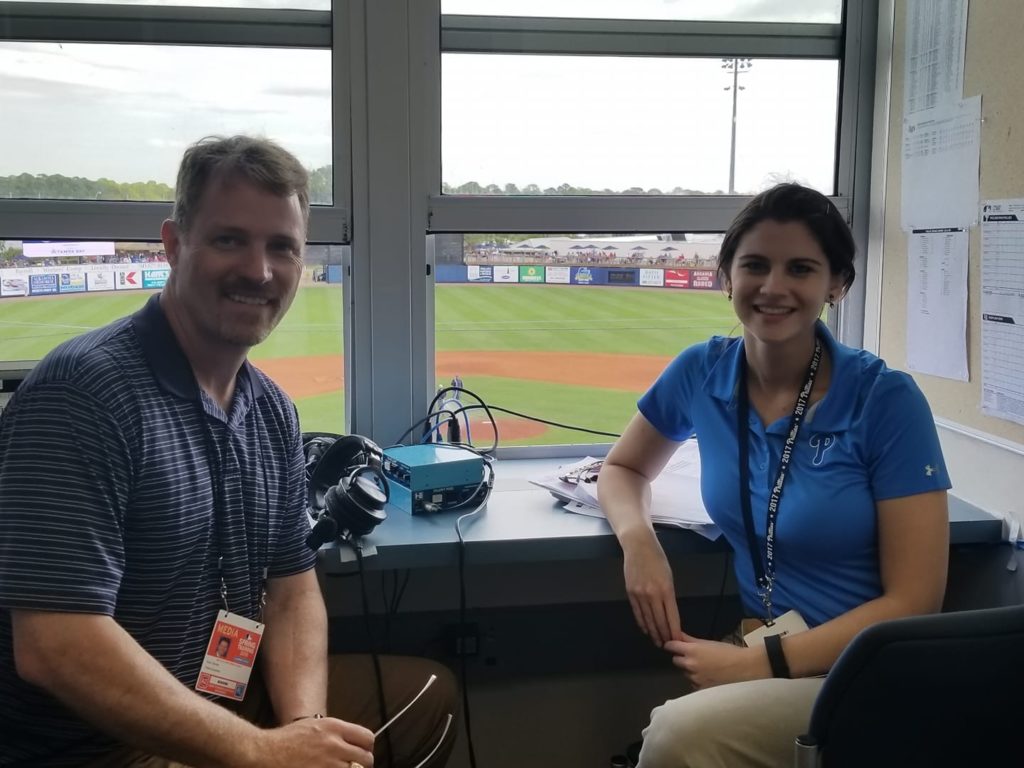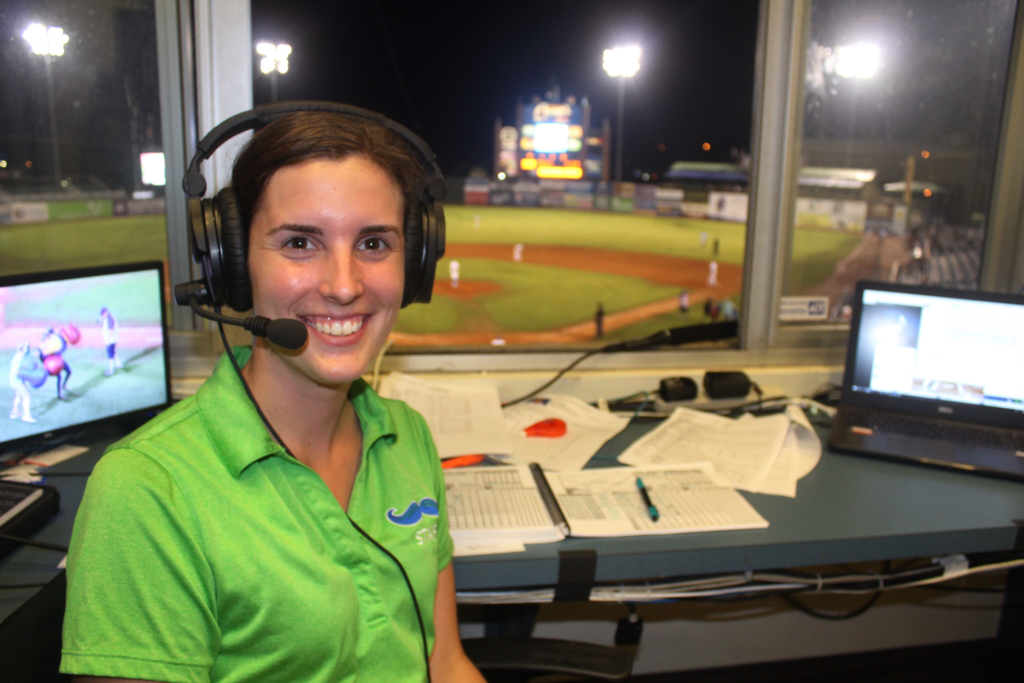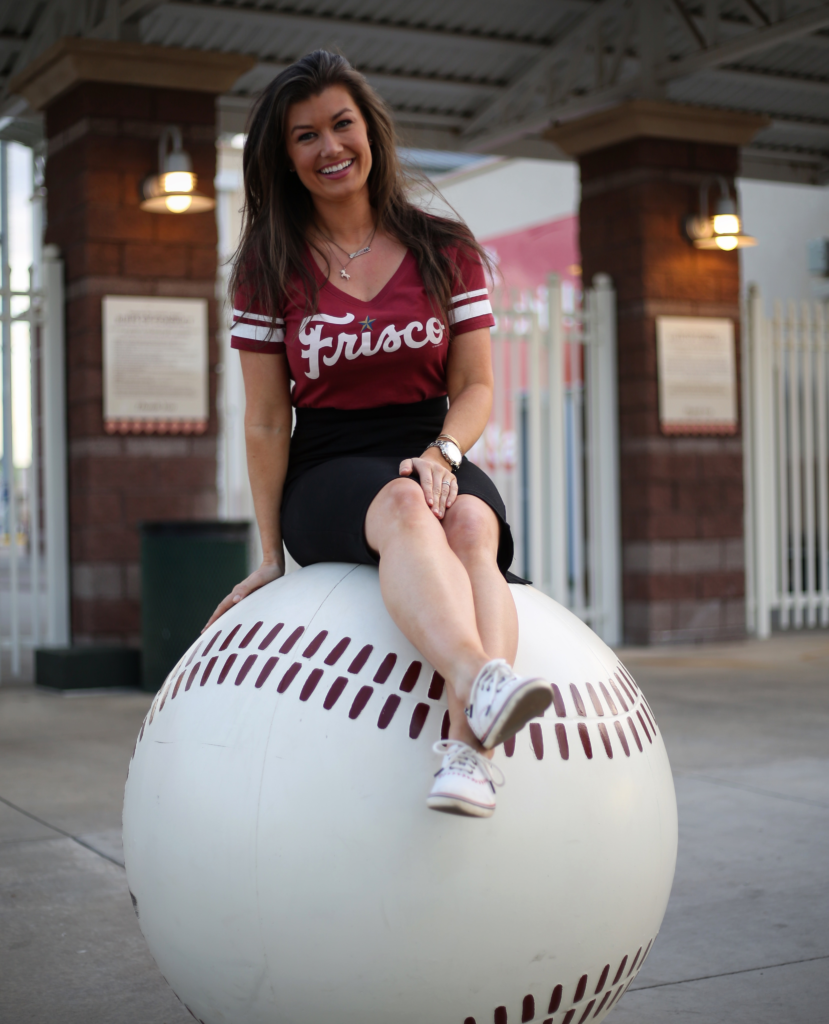Kirsten Karbach volunteered at her college radio station in Florida. Emma Tiedemann’s grandfather handed her his headset at a college basketball game in Texas. Melanie Newman pursued photojournalism in Alabama. And Suzie Cool juggled six jobs in Pennsylvania.
In 2018 they worked in the Florida State League, the South Atlantic League, the Texas League, and the Carolina League, respectively — four women joined by a common thread: They broadcast Minor League Baseball games.
Important Times for Women in Baseball Broadcasting
These are important times for women in the baseball broadcast booth.
The first female baseball broadcaster was Betty Caywood in 1964, hired by Charlie O. Finley away from her position delivering the weather at Channel 7 in Chicago to do color commentary for a season for the Kansas City A’s. In 1977, reporter Mary Shane, who later became the first woman to cover the Boston Celtics, was given the microphone by Harry Caray for three straight games, followed by a job offer from WMAQ to join Caray, Lorn Brown and Jimmy Piersall on the White Sox broadcasts. She called 20 games in all. “She never had a chance,” said Piersall later. “It was a real shame, because I think she had what it takes to make it, and some day the idea of a woman bringing a woman’s perspective to baseball broadcasting will be a tremendous innovation somewhere.”
Former SportsCenter anchor and NBC sports reporter Gayle Gardner became the first female play-by-play broadcaster in the Major Leagues, calling the Colorado Rockies’ game against the Cincinnati Reds on August 3, 1993. On July 24, 1995, WFAN beat reporter Suzyn Waldman became the first woman to announce on a national baseball broadcast. A year later Waldman joined the Yankees’ television broadcast team, and then moved in 2005 to the radio booth alongside John Sterling for what has become a 14-season partnership delivering the sounds of Yankees baseball.
TBS stepped forward on August 19, 2012, bringing in ESPN softball color commentator and two-time Olympic softball gold medalist Michele Smith to join Ernie Johnson and John Smoltz to call the Atlanta Braves’ game against the Los Angeles Dodgers. Three years later, on August 24, 2015, Jessica Mendoza became the first woman to join an ESPN baseball broadcast, accompanying Dave O’Brien and Dallas Braden. Like Waldman, Mendoza’s role became permanent, officially named part of the Sunday Night Baseball broadcast team beginning in 2016.
And on April 23 of this season, Jenny Cavnar — who had originally debuted on Rockies radio on July 2, 3, and 4 of 2015 — handled Colorado Rockies TV play-by-play on AT&T SportsNet, the first woman to call Major League Baseball television play-by-play since Gardner in 1993.
In the Minor Leagues, the going has been equally slow to advance. Leslie Callison notably served as the radio voice of the 2001 Springfield Capitals (independent; Frontier League), their final season in existence, but her story turned to be out to be a rare exception.
The Rise of Kirsten Karbach
Enter Kirsten Karbach.
Karbach grew up south of Tampa, her attention tuned to the sounds Dave Wills and Andy Freed calling Rays baseball. She originally enrolled in the University of Tampa, where at one time she was a psychology major, and then transferred to the University of South Florida. There, during her sophomore year, she began volunteering at Bulls radio.
“I honestly never imagined myself as a broadcaster until college,” Karbach said. “A couple months in, there was one Saturday where I spent all day assisting with on-site production of USF football, then did color for a women’s basketball game that night. I ended up working a 12-hour day, unpaid, and enjoyed every minute of it.”
Her summers became dedicated to the Florida State League. In 2011, she assisted the Dunedin Blue Jays’ Craig Durham during several contests with game recaps and color commentary. In 2012, following her junior year, she interned as a broadcast assistant for Grant McAuley with the Charlotte Stone Crabs, who she says, “taught me everything I know about running a broadcast.” In 2013, following her graduation, she joined the Clearwater Threshers as the No. 2 broadcaster under lead voice Ben Gellman. And in 2014, Kirsten Karbach was named the new Voice of the Threshers, a position she has held for the past five years.
“The most fulfilling part is really the opportunity to be around the game every day,” Karbach said. “To watch these guys develop, and to have conversations, and continually learn from those in the game. Plus, having the chance to call a dramatic moment, being the person responsible for painting the picture and portraying that emotion — there’s nothing better.”
Her opportunities have grown at the same pace as her on-air ability, handling broadcasts of the Women’s Baseball World Cup (giving her the chance to cross paths again with Durham), the Canadian Junior National Team and the American Athletic Conference, plus innings alongside Phillies broadcasters Scott Franzke and Larry Anderson in spring training. And she has embraced her role, emceeing a Women in Baseball panel at the 2017 Baseball Winter Meetings in Orlando. “If you have a passion for working in sports,” said Karbach, “then gender is irrelevant. If you work hard, and you have the drive and knowledge and the passion for the game, then you should absolutely pursue it.”
Tiedmann, Newman, Cool Join the Scene in 2018
From 2014 through 2017, Karbach was the only woman serving as a lead broadcaster in baseball. Then, at the 2017 Winter Meetings, the Lexington Legends brought on Emma Tiedemann as their new voice — the South Atlantic League’s first female broadcaster.
Tiedemann’s passion for sports might well have come straight from her DNA. “I grew up listening to stories of broadcasting,” she said. “My grandfather always would talk about his time in the booth and the unique instances in his career which sparked an interest in me. I would travel with him if he joined baseball broadcasts with teams such as the Frisco Roughriders and Round Rock Express.”
Her grandfather is Bill Mercer, whose time and experience spent in the broadcast booth is incomparable. He broadcast for the Chicago White Sox, handled the call for World Class Championship Wrestling, and was hired to be the very first voice of the Texas Rangers. He was also the voice of the Dallas Cowboys, calling the famed Ice Bowl, the 1967 NFL Title game against the Green Bay Packers. “From having to purchase de-icer for the window of their broadcast booth, to the incredible football game,” said Tiedemann, “it’s a fascinating story that is one of my favorites.”
Unlike Karbach, Tiedemann did not wait until college to get started. As a 15-year-old, she was in the right place at the right time — at her grandfather’s side at a college basketball game. “He was filling in at the University of Texas at Dallas,” she remembered, “and asked me to sit with him and help him keep score. He also had an extra headset which he handed me and said, ‘If you feel like talking about the game, feel free!’ Well, he says I talked the whole time.”
From that initial experience on the air, Tiedemann began calling basketball, volleyball, softball, baseball and soccer games at the University of Texas at Dallas. “The point at which I decided I wanted to be a broadcaster was when I was a sophomore in high school,” she said. “I had been broadcasting at least once, if not twice a week, and knew I wanted to do that for the rest of my life.”
Following high school, Emma Tiedemann attended the University of Missouri, where she gained her first experience calling football. In 2014, she traveled farther north, up to Palmer, Alaska, as the new Voice of the Alaska Baseball League’s Mat-Su Miners. It was an important season. “It was in Alaska,” she said, “that I fell in love with the grind and beauty of baseball and decided I was going to pursue a career in baseball.” She drove onward, to Medford, Oregon, each of the next two summers, working as the Communications Manager for the Medford Rogues (summer collegiate). In 2017, she was hired as the No. 2 broadcaster for the St. Paul Saints (independent; American Association), learning from Ballpark Digest’s 2016 Broadcaster of the Year, Sean Aronson.
Her next stop: The Legends of Lexington, Kentucky – the 2018 South Atlantic League Champions.
“I honestly did not expect to get a lead broadcasting position as my first job in MiLB,” Tiedemann said. “I was told I would face hardships because of my gender and because I was in independent baseball the season before. The Legends welcomed me with open arms and selected me because I was the best person for the job, a phrase that I have come to value.
“Also, winning a championship in your first season isn’t so bad!”
While Karbach and Tiedemann serve the traditional lead broadcast roles with their teams, Melanie Newman carved out a position unlike any other in 2018, crossing through both radio and television airwaves with the Frisco RoughRiders (Class AA; Texas League).
“I was morbidly shy growing up,” Newman remembered. “I wanted to be a vet, then a teacher, then a photojournalist. I originally wrote in high school and at that time started to compete in pageants that brought me out of my shell. In college they suggested I switch to broadcast as print was dying so I went with it.”
Encouraged by Troy University SID Ricky Hazel, she gained experience both in front of and behind the camera; worked with both the communication and athletics departments; broadcasted three years of Division I volleyball, baseball and softball games, “and one forgettable soccer match”; and was named Troy Outstanding Student Leader 2012 and Troy University’s Most Outstanding Woman 2012 among a litany of other honors. When Hazel moved onward to Stetson University, he invited her to continue to assist him with the 2012 Atlantic Sun Conference baseball tournament, opening the door to three years serving as an Atlantic Sun Conference sideline reporter for ASun.TV, ESPN3 and ESPNU.
In 2014, she jumped into the world of baseball, moving from a wooden-bat collegiate club in Kilgore, Texas, to the Mobile BayBears (Class AA; Southern League) in August. With the BayBears, Newman worked as on-field emcee and made sales — and also fit in time to join No. 1 broadcaster Justin Baker on the air whenever possible. At the end of the season, to cap a busy summer, she began a four-year stint in the Arizona Fall League in both baseball development and communications, covering the top prospects for seven different organizations. That role grew into Media Communications Coordinator for the league as a whole, directed through the commissioner’s office.
But it wasn’t all easy times and new successes for Newman. “The biggest obstacle,” she said, “is always taking so many hundreds of no’s and convincing yourself you’re still a part of this and this is where you belong. The key is leaning on your inner circle and mentors and trusting the process. Every no just means it wasn’t a good fit for you.”
Entering the 2018 season, she found the right fit, tailored perfectly to her talent and experience.
“As Frisco opened its season with a 5-2 loss to Tulsa on April 5,” wrote Tyler Maun for MiLB.com, “Newman was perched in a camera well next to the visiting dugout, providing in-game reports and commentary, from weighing in on Major League news to introducing the 2018 RoughRiders to fans tuned in to see their new squad. One day later, she was in the Frisco radio booth alongside lead voice Ryan Rouillard.”
It was avant garde for Minor League Baseball: If the RoughRiders were on television, Melanie Newman was as well. If they weren’t, she was on the radio. “The connections to fans and athletes is something you can’t buy. Having someone tell you how much they appreciated a certain story or angle is the moment I know I’m doing my job right because this isn’t about me at all, it’s about building those emotional connections.”
Newman’s prominent work brought even more positive notice to the women broadcasting Minor League Baseball — and it gave Suzie Cool, in her rookie season with the Salem Red Sox (High A; Carolina League), an idea.
Growing up outside Pittsburgh, Cool was a broadcaster at heart. “Whenever I was in high school,” she said, “in my English classes, we always had the choice of writing papers, doing a project, or we could make a video. I always made videos of me doing newscasts with pens, or talking about my class.” She did not initially seek out sports broadcasting at Saint Vincent College in Latrobe, Pennsylvania. Then a friend told her that the Pirates were looking for ballgirls. Intrigued, Cool interviewed for the position alongside her friend. The friend was rejected. Cool was hired. “My first night ballgirling, when I walked onto the PNC Park field,” she said, “I was like, this is what I want to be a part of.”
Through skill and determination, she began finding more opportunities: media relations intern with the Pittsburgh Penguins, live production intern at ROOT Sports (now AT&T Sports in Pittsburgh), in-arena host with hockey’s Wheeling Nailers (ECHL), producer at 93.7 The Fan, in-game host with the USL’s Pittsburgh Riverhounds, and videoboard co-host for the Pittsburgh Pirates, plus a job at her gym on top of it all. A typical day in September 2017: “I’ll start work at 5 a.m., I’ll get off work at 11, I’ll go into the Pittsburgh Riverhounds and record my little segment for the week, I’ll have two hours to do [grad school] homework, I’ll go to the TV station, [then] go and record my pre-game hits for the Pirates, and then go back on the TV track.”
Cool attended grad school at Point Park University in Pittsburgh, looking to take advantage of Point Park’s broadcast program and make herself more marketable. The decision worked out: Point Park University paid all costs for Cool to attend the PBEO Job Fair at the 2017 Baseball Winter Meetings, where she accepted an offer to join Salem as on-field host and media and graphics assistant. The Red Sox’s broadcaster coincidentally was Ben Gellman, the former Clearwater Threshers broadcaster in 2013.
“This one day,” said Cool, “I’m sitting at my desk and — shout-out to Melanie Newman — I came across her Twitter and I saw how just unbelievable everybody thinks she is, and how she’s one of three women doing broadcasting in the Minor Leagues…. And I had an epiphany at my desk. What the heck is stopping me from asking if I can go and do this, too? So I literally got up from desk, and I went and I asked. I asked if I could go on the broadcast and make history for our organization, and [president/general manager] Ryan Shelton, [vice president/assistant general manager] Allen Lawrence and [radio broadcaster] Ben [Gellman] were all completely for it.”
On Friday, May 4, her mother’s birthday, Suzie Cool became the first woman to broadcast a game in Carolina League history, serving as color commentator at Gellman’s side. “That was the moment that I said, ‘You can do this! You’re finally making a mark.’ ” It was the first of about 40 Red Sox games that Cool spent on the air. “After the sixth inning, when I was finally done [hosting the in-game entertainment], I would sprint up to the booth and I would finish off the broadcast with Ben. I would travel on the road with the team at my own expense because I wanted to get enough experience and doing only three innings every couple of home games wasn’t going to cut it.
“Honestly, I loved it.”
She added, “I know I was rough that first night. I know that I’m still rough… I can admit that. But for jumping into it and not knowing how it was going to pan out, I think I do a pretty good job. So I’m proud of myself that I took on such a big challenge. No matter what people said, whether it was negative or positive, you’ve got to listen back to the tapes and correct yourself and take criticism with ease. You’re never going to be perfect at whatever you do.”
Resonating With Fans
For any broadcaster, from Cool, just beginning her on-air career, to Emma Tiedemann, who has been broadcasting since she was 15, feedback is an expectation. “This might be jinxing it,” said Tiedemann, “but I have never heard or seen anything negative from a fan. That’s throughout my nine years of calling games. All in all, the hardships have been less than I have come to expect.”
Tiedemann’s most memorable piece of feedback arrived earlier this year. “A father messaged me on Twitter, telling me that his daughter had heard my voice on the concourse while they were at a Legends game. She was currently playing Little League baseball, and he wanted her to know that this was a career path option for her in the sport of baseball. I had the opportunity to meet her, and some of her teammates, and let them know that their gender doesn’t have to define the path their life takes. They can do whatever the boys can do.”
Melanie Newman received a similar message. “I was watching a Frisco game on my phone last week,” wrote the RoughRiders fan, “and my daughter was entranced with your voice. She had never heard a woman calling a game and begged me to let her keep listening even thought it was bedtime…. My wife and I try to impress on her that there aren’t any activities or jobs that belong just to boys, and you’re another example we can give her.”
As for Kirsten Karbach, the first of the four women to enter the Minors, she received a message of a different sort. It was delivered by her peers at season’s end, a testament to how she is perceived. She was named the 2018 Florida State League Broadcaster of the Year.




